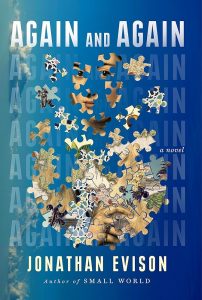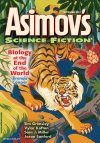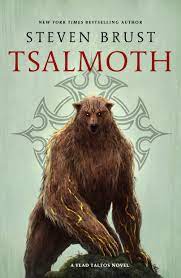Ian Mond Reviews Again and Again by Jonathan Evison
 Again and Again, Jonathan Evison (Dutton 978-0-59318-415-8, $28.00, 336pp, hc) November 2023.
Again and Again, Jonathan Evison (Dutton 978-0-59318-415-8, $28.00, 336pp, hc) November 2023.
I’ve been a massive fan of Jonathan Evison’s fiction since encountering his 2012 novel The Revised Fundamentals of Caregiving. Not only does Evison have a cracking sense of humour, but he can see beauty and humanity in the darkest and most challenging of situations. I never thought, though, that I’d be reviewing one of Evison’s books in the pages of Locus. The closest he’d come to genre fiction was the dual timelines in his last novel, Legends of the North Cascades, where Bella, living off the grid with her father in a cave, has visions of a mother and son inhabiting the same cave just before the end of the last Ice Age. But if Legends of the North Cascades exists in a liminal space between literary and genre fiction, Evison’s latest novel, Again and Again, sits more firmly on the genre side of the equation. The main character, Eugene Miles, claims to have been reincarnated six times, perfectly recalling his past lives, including six years as Oscar Wilde’s cat. While a central question of Again and Again is whether we can trust Eugene (he’s not the most reliable of narrators), Evison’s full-bodied commitment to the concept, both structurally and tonally, gives this delightful, sympathetic novel about mortality, friendship, and love a distinctly fantastic quality.
Over a century old, Eugene resides at Desert Greens, an eldercare facility in the Californian desert where he has spent the last twelve years. He is aloof, keeping his distance from the other residents, occupying his time with jigsaw puzzles, books, and pining for his deceased wife Gladys, whom he also knew as Gaya in a previous existence a thousand years ago. Eugene tells us he’s resigned to his isolation, but fate has other plans. He comes to befriend (reluctantly at first) Desert Greens’ new custodian, Angel. The young man’s affable nature and willingness to listen and not judge compels Eugene to open up about his first life. Parcelling out his past like the chapters in a novel, Eugene recalls his years in 11th-century Spain, where he was known as Euric, a ‘‘lowly Visigoth, the bastard son of a conquered tribe, who barely knew his mother and father.’’ With no one to support young Euric, he becomes a cutpurse to survive. And it’s on the run from a wealthy merchant (whose purse he has just lifted) that Euric first comes across Gaya, who saves his life. It’s love at first sight (well, for Euric anyway). Back to the present, and the bond between Eugene and Angel deepens, the younger man sharing his problems at home. But when Desert Greens’ mental health liaison, Wayne, who has an unhealthy obsession with Eugene, starts to poke holes in the older man’s claims about his current life – that he’s over 100 years old, that he fought in the Second World War, that he was married to Gladys for 35 years – Angel, like so many before him, begins to wonder whether Eugene is simply a deluded old man.
Evison is a consummate storyteller, with the gift of drawing you into his narrative from page one and keeping you there. It’s fitting then that Again and Again is all about storytelling. Whether we believe him or not (and by the end of the novel, I was on team ‘‘reincarnation’’), all Eugene has as evidence are the stories of his past. That he treats his life as a dramatic tale, one with built-in cliff-hangers to keep Angel (and the reader) coming back for more, could lead us to view him as a lonely charlatan. But like the author who created him, Eugene’s storytelling has an authenticity and emotional truth that’s difficult to resist. In fact, when we discover that Eugene has lied about elements of his more recent past, like Angel, you can’t help but feel betrayed – that is, until you realise why.
Telling a story also means establishing a connection with another person. Eugene might be distant and removed from the residents of Desert Greens, but that’s not his default state. As a kid, working at his parents’ petrol station, he spoke to the customers, regaling them with his past lives. As a cat, he had the ‘‘lavish attentions of Oscar’s affections at [his] disposal.’’ As a lovelorn cutpurse, he is willing to sacrifice himself to keep Gaya safe. Yet, it’s in making those connections – fleeting (with the customers) or full-bodied (with Oscar and Gaya) – that leads to Eugene’s most traumatic experiences. It’s why, when we meet him, Eugene presents as a curmudgeon. But what Again and Again argues is that all these relationships, no matter what ultimately comes of them, have value in and of themselves. It’s a theme Evison has repeatedly returned to in his fiction, the idea that the bonds we create with others are as vital as air and sustenance. Some might view this message as twee or sentimental. But in the hands of a skilled storyteller like Evison, it’s not so much a revelation as a call to action, a strident reminder that our best lives require love and friendship.
Ian Mond loves to talk about books. For eight years he co-hosted a book podcast, The Writer and the Critic, with Kirstyn McDermott. Recently he has revived his blog, The Hysterical Hamster, and is again posting mostly vulgar reviews on an eclectic range of literary and genre novels. You can also follow Ian on Twitter (@Mondyboy) or contact him at mondyboy74@gmail.com.
This review and more like it in the December and January 2023 issue of Locus.
 While you are here, please take a moment to support Locus with a one-time or recurring donation. We rely on reader donations to keep the magazine and site going, and would like to keep the site paywall free, but WE NEED YOUR FINANCIAL SUPPORT to continue quality coverage of the science fiction and fantasy field.
While you are here, please take a moment to support Locus with a one-time or recurring donation. We rely on reader donations to keep the magazine and site going, and would like to keep the site paywall free, but WE NEED YOUR FINANCIAL SUPPORT to continue quality coverage of the science fiction and fantasy field.
©Locus Magazine. Copyrighted material may not be republished without permission of LSFF.






